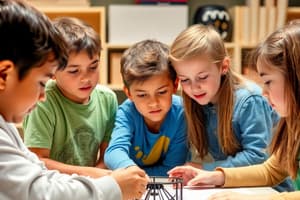Podcast
Questions and Answers
What is the primary purpose of seeking additional information, according to the text?
What is the primary purpose of seeking additional information, according to the text?
- To address gaps in knowledge and move forward. (correct)
- To solely satisfy curiosity.
- To demonstrate existing skills and competencies.
- To overwhelm with an excess of data.
What is the relationship between skills and competencies?
What is the relationship between skills and competencies?
- Skills are a subset of competencies. (correct)
- Skills are a combination of competencies and knowledge.
- Skills and competencies are interchangeable terms.
- Competencies are solely defined by skills.
Which of the following best describes 'competence' as presented in the text?
Which of the following best describes 'competence' as presented in the text?
- A proficiency in a specific task area.
- A personal characteristic based on knowledge, experience, upbringing, education, and social environment. (correct)
- A set of skills acquired through formal education only.
- The ability to apply theoretical knowledge to practical situations.
What is noted about the terms 'competencies' and 'competence' in EU documents, as referenced by the text?
What is noted about the terms 'competencies' and 'competence' in EU documents, as referenced by the text?
How does the text characterize the definitions of 'skills', 'competencies', and 'competence'?
How does the text characterize the definitions of 'skills', 'competencies', and 'competence'?
What is a key characteristic of an individual with high learning competencies?
What is a key characteristic of an individual with high learning competencies?
In which of the following contexts can competencies be viewed?
In which of the following contexts can competencies be viewed?
Which factor necessitates increased engagement in lifelong learning according to the text?
Which factor necessitates increased engagement in lifelong learning according to the text?
Which grouping represents interpersonal skills as defined in the 2013 study?
Which grouping represents interpersonal skills as defined in the 2013 study?
What is a key element of personal skills in the context of learning?
What is a key element of personal skills in the context of learning?
Which factor was NOT a key prompt for the presented agenda?
Which factor was NOT a key prompt for the presented agenda?
What is NOT one of the four priority areas of the program?
What is NOT one of the four priority areas of the program?
What is the target participation rate for individuals aged 25-64 in training within the last 12 months?
What is the target participation rate for individuals aged 25-64 in training within the last 12 months?
What percentage of unemployed individuals (aged 25-64) who have recently completed training is targeted by the program?
What percentage of unemployed individuals (aged 25-64) who have recently completed training is targeted by the program?
What is the target for individuals aged 16-74 possessing basic digital skills?
What is the target for individuals aged 16-74 possessing basic digital skills?
What age range primarily describes the population targeted for adult learning?
What age range primarily describes the population targeted for adult learning?
What is the target participation rate for low-skilled individuals aged 25-64 in training in the last year?
What is the target participation rate for low-skilled individuals aged 25-64 in training in the last year?
In what year is the program set to conclude according to the text?
In what year is the program set to conclude according to the text?
According to the provided information, what is the approximate frequency of cyberattacks?
According to the provided information, what is the approximate frequency of cyberattacks?
What percentage of cyberattacks utilize stolen data, according to the content?
What percentage of cyberattacks utilize stolen data, according to the content?
In 2023, through which method did malware threats most commonly occur?
In 2023, through which method did malware threats most commonly occur?
What was the percentage of data breaches in the healthcare sector that resulted from phishing attacks during 2023?
What was the percentage of data breaches in the healthcare sector that resulted from phishing attacks during 2023?
In the education sector, what was the primary cause of 36% of attacks?
In the education sector, what was the primary cause of 36% of attacks?
According to a study by the Bulgarian Chamber of Commerce, what percentage of employed individuals in Bulgaria meet the required level of digital competency for their position?
According to a study by the Bulgarian Chamber of Commerce, what percentage of employed individuals in Bulgaria meet the required level of digital competency for their position?
Besides needing digital skills, what has technology transformed, according to the content?
Besides needing digital skills, what has technology transformed, according to the content?
Flashcards
Learning Competence
Learning Competence
The ability to learn new things effectively, including assessing when learning is needed, choosing appropriate learning methods, and seeking out learning opportunities.
Cognitive Skills
Cognitive Skills
Skills that involve thinking critically, solving problems, applying knowledge, and being creative.
Interpersonal Skills
Interpersonal Skills
Skills that involve interacting effectively with others, including good communication, teamwork, leadership, and understanding different cultures.
Personal Skills
Personal Skills
Signup and view all the flashcards
Lifelong Learning
Lifelong Learning
Signup and view all the flashcards
Information Need
Information Need
Signup and view all the flashcards
Competency
Competency
Signup and view all the flashcards
Competence
Competence
Signup and view all the flashcards
Skill
Skill
Signup and view all the flashcards
Data and Information Requirement
Data and Information Requirement
Signup and view all the flashcards
Phishing Attack
Phishing Attack
Signup and view all the flashcards
Cyberattacks occur every 39 seconds
Cyberattacks occur every 39 seconds
Signup and view all the flashcards
Stolen data in cyberattacks
Stolen data in cyberattacks
Signup and view all the flashcards
Digitalization increases cybercrime
Digitalization increases cybercrime
Signup and view all the flashcards
Digital Competency
Digital Competency
Signup and view all the flashcards
Digital Inequality
Digital Inequality
Signup and view all the flashcards
Digital Skills in Employment
Digital Skills in Employment
Signup and view all the flashcards
European Skills Agenda
European Skills Agenda
Signup and view all the flashcards
Basic Digital Skills
Basic Digital Skills
Signup and view all the flashcards
Upskilling
Upskilling
Signup and view all the flashcards
Reskilling
Reskilling
Signup and view all the flashcards
Adult Learning
Adult Learning
Signup and view all the flashcards
Low-skilled Individuals
Low-skilled Individuals
Signup and view all the flashcards
Participation Rate in Training
Participation Rate in Training
Signup and view all the flashcards
Study Notes
Information Literacy Frameworks and the Term "Information"
- The need for understanding data, information, and knowledge is crucial for 21st-century competencies.
- Data are a collection of facts about an event, object, process, or phenomenon. They are difficult to use meaningfully in their raw form.
- Information arises when data are placed in context and interpreted, enabling deeper understanding.
- Knowledge emerges from the analysis of information, viewed through personal experiences, values, and perspectives.
Defining Data, Information, and Knowledge
- Data are unorganized facts or figures.
- Information is organized data in context.
- Knowledge is the understanding derived from information.
21st Century Skills
- Cognitive skills include critical thinking, problem-solving, and creativity.
- Interpersonal skills involve communication, collaboration, and leadership.
- Personal skills encompass motivation, self-direction, and lifelong learning.
Contemporary Skills
- Learning skills encompass critical thinking, creativity, collaboration, and communication.
- Knowledge skills (digital literacy) cover information, media, and technological literacy
- Life skills encompass adaptability, leadership, initiative, productivity, and social skills.
Information Literacy
- Information literacy involves recognizing information needs, locating information effectively, critically evaluating information, and using information effectively.
- Information literacy is important for personal and societal well-being and for activities such as daily decision-making, problem-solving, and creativity.
- Information literacy skills enable citizens to navigate information, evaluate sources, and use information ethically.
Information Literacy Framework
- A crucial framework for information literacy is the one provided by the Association of College and Research Libraries (ACRL) for higher education.
- The framework has conceptual pillars covering different perceptions to contextualize information.
- The framework provides practical knowledge, attitudes, and abilities for information literacy.
Information Sources
- Information can be found in diverse formats, documents, and carriers.
- Information sources are classified into primary, secondary, and tertiary categories.
- Primary sources present original information or data.
- Secondary sources summarize and interpret primary sources.
- Tertiary sources synthesize information from primary and secondary sources, providing general overviews.
Legal Use of Information
- Intellectual property rights protect creations of the mind, including works of art, literature, or inventions.
- Copyright law grants authors control over their works' use but allows for exceptions, such as for educational use or criticism/analysis.
- Exceptions in copyright legislation must comply with national and international regulations, reflecting the specific needs of the country, to maintain a balance between the needs of authors and the public.
Information Literacy and Technology
- Digital technologies affect information access, usability, and the way people interact with information.
- The increase in digital information sources demands greater critical evaluation skills from individuals to filter misleading or unreliable information from credible sources..
- Information literacy strategies can be used effectively by libraries, teachers, students, and individuals when working with emerging technological developments such as artificial intelligence.
Studying That Suits You
Use AI to generate personalized quizzes and flashcards to suit your learning preferences.
Related Documents
Description
This quiz explores key concepts related to skills, competencies, and their significance in lifelong learning, as outlined in the given text. It examines definitions, relationships, and the importance of engaging in continuous education for personal and professional growth.




